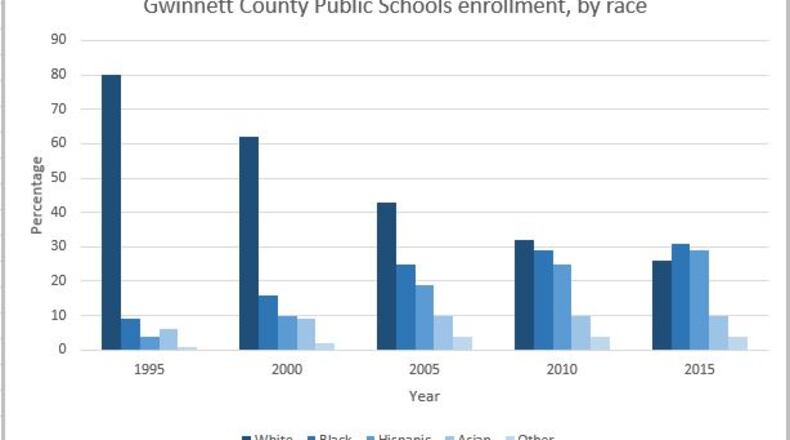Statewide, students performed a bit better on the second round of the Georgia Milestones compared to last year when the test made its debut.
As the AJC just reported: In 1995, 80 percent of Gwinnett County Public Schools students were white. By 2015, that number dropped to just 26 percent, according to the ARC's data. Over the same time period, the school system's share of Hispanic students increased sevenfold — from 4 percent to 29 percent — and the proportion of black students more than tripled, from 9 percent to 31 percent... Gwinnett became a "majority minority" county — meaning non-white residents account for more than half of the population — in 2010, and the ARC projects that the county will have more Hispanic residents than white ones by 2040 .
Yet, Gwinnett County students continue to surpass statewide average in almost every area. Forty-three percent of county third-graders were proficient or better in English/Language Arts, eight percentage points higher than the state average. Nearly half of Gwinnett's fifth-graders were proficient or better in math, 11 points higher than the state average. The percentage of Gwinnett's eighth-grade students deemed "proficient" was nine percentage points better than 2015.
Part of the increase in scores in Gwinnett and statewide reflects increased teacher familiarity with the test. But familiarity did not seem to burnish the performance of Atlanta Public Schools.
These test scores represent the second year that a new superintendent, Meria Carstarphen, has led Atlanta schools. Compared to last year, Atlanta saw lower scores in some grades and subjects. That's unusual. This is also the second year Georgia students took these particular state tests. As students and teachers become more familiar with a test's format, scores tend to go up.
Nor did familiarity appear to make a significant difference in DeKalb, according to AJC reporter Marlon Walker. Walker reports more than two-thirds of the district's students failed to reach proficiency across grades. But there were promising signs, which DeKalb Schools highlighted in this statement:
The percentages of Cobb students rated proficient or distinguished generally was better in the higher grades, but two math tests gave high school students some trouble: only a little more than 14 percent were proficient in analytic geometry, and just under 19 percent in coordinate algebra. In biology, the proportion of proficient scorers was just under 62 percent and in physical science, more than 70 percent.
In Fulton, about half of the students scored proficient or better in English and math and performed better than the statewide average, reported the AJC.
About the Author






